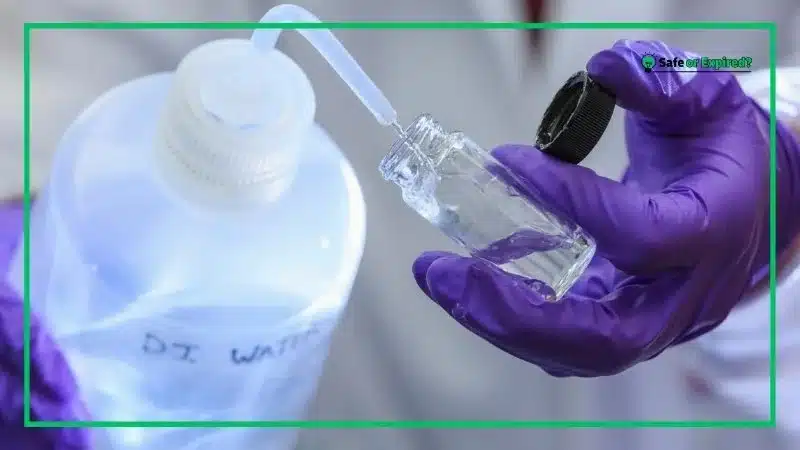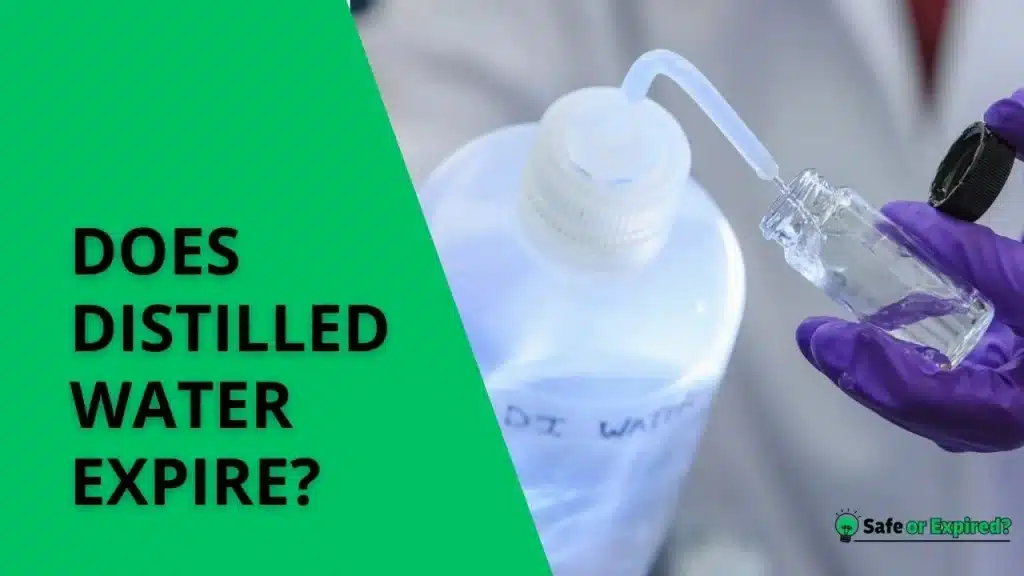“Does distilled water expire?” is a common question, and you may find the answer shocking. It doesn’t expire. However, it can cause problems, and you will find out all the details in this ultimate guide. So, continue reading.
Does Distilled Water Expire?
Distilled water does not expire because it is free of impurities and minerals that typically cause water to degrade. However, the quality of distilled water can be compromised over time if its container becomes contaminated. Therefore, while the distilled water itself remains stable indefinitely, it’s crucial to store it properly.
Furthermore, you should also ensure the packaging remains intact to preserve its purity. People often ask, “Does distilled water need to be refrigerated after opening?” Well, no. You won’t have to refrigerate distilled water after opening. However, keeping it in a cool place can help maintain its purity by reducing the risk of microbial growth influenced by environmental factors.
Now, let’s settle the open vs unopened debate.
Does Unopened Distilled Water Expire?
Unopened distilled water does not expire because it is free of minerals and impurities that typically lead to the degradation of water quality. The integrity of the water depends more on the condition of the container.
Note that distilled water can stay safe to use forever if:
- The seal on the bottle is unbroken.
- The bottle is kept out of direct sunlight.
Does Opened Distilled Water Expire?
Once opened, distilled water can be susceptible to airborne contaminants and should ideally be used within a few weeks. To extend its shelf life, keep the cap tightly closed and store the container in a clean area (away from direct sun rays and sources of contamination).

How Long Does Distilled Water Expire?
Distilled water does not expire and remains safe to use indefinitely as long as it is stored properly and the container remains uncontaminated. Its lack of minerals and impurities prevents the typical degradation process that affects other types of water.
People also ask, How long is distilled water good for once opened for baby formula? Once opened, distilled water should be used within 24 to 48 hours when preparing baby formula to ensure its purity and safety. After this period, it’s advisable to use a fresh supply to prevent any risk of contamination that could affect a baby’s health.
Another query I often receive is, “How long does distilled water last for CPAP?” For CPAP machines, it is recommended to replace distilled water daily to maintain optimal performance and hygiene. Even though distilled water does not expire, frequent changes prevent any potential microbial growth and ensure that the air humidity generated is clean and safe.
Here’s the completed expiry table for distilled water in various storage conditions:
| Storage Condition | Opened Distilled Water | Unopened Distilled Water |
| Counter | Use within 2-3 weeks | Indefinitely safe |
| Fridge | Use within 4-6 weeks | Indefinitely safe |
What Are the Signs That Distilled Water is No Longer Pure?
If distilled water has an unusual taste or odor, or if the container shows signs of damage or contamination, it may no longer be pure. Cloudiness or particles in the water are also indicators that it should not be used. These signs suggest environmental contaminants have compromised the water’s purity.
Unusual Taste or Odor
If your distilled water starts to taste or smell different, it’s a clear sign that it has been contaminated. Chemicals, plastic from the container, or microbial growth can alter the taste and smell of distilled water.
Container Damage
Any cracks, leaks, or signs of swelling in the container can allow bacteria, dust, and other environmental contaminants to enter and compromise the purity of the distilled water. Always inspect the container for integrity before use.
Cloudiness or Particles
Pure distilled water should be completely clear. Any cloudiness or visible particles are indicators of contamination. This could be due to poor storage conditions or a degraded container allowing materials to leach into the water.
Algal Growth
If distilled water is stored in light-exposed containers for prolonged periods, it may promote algal growth, which can turn the water greenish and introduce unpleasant smells.
pH Changes
Remember that distilled water has a neutral pH (7). Any significant change in pH levels can indicate chemical reactions within the container or environmental exposure, suggesting the water is no longer pure.
These signs are crucial to monitor to ensure the safety and purity of distilled water, especially when used for sensitive applications like medical devices or infant formula.
Knowing the reasons behind food spoilage can help you prevent it more effectively. Dive into “The Causes of Spoilage You Must Know.”
Are There Any Health Implications of Using Old Distilled Water?
Using old or improperly stored distilled water can lead to health risks such as gastrointestinal infections from bacteria or chemical exposure if contaminants have leached from the container. It’s crucial to ensure distilled water is fresh and stored correctly to avoid these health concerns.
Risk of Bacterial Contamination
Stored distilled water, especially if opened, can become a breeding ground for bacteria over time. Consuming such water can cause gastrointestinal distress or more severe infections, particularly in individuals with compromised immune systems.
Exposure to Chemical Contaminants
If distilled water is stored in low-quality plastic containers that degrade, chemicals such as BPA or phthalates may leach into the water. Long-term consumption of these chemicals can lead to endocrine disorders and other health issues.
Is It Safe to Use Distilled Water for Cooking After It Expires?
Using distilled water for cooking after it “expires” is generally safe, assuming the water has been stored correctly and shows no signs of spoilage, such as cloudiness, unusual taste, or odor. However, it’s crucial to ensure that the storage container has remained sealed and free from contaminants to prevent any health risks.
Understanding “Expiration” of Distilled Water
Distilled water does not actually expire in the traditional sense, as it does not contain organic matter that can spoil. The main concern is the potential for chemical leaching from the container or bacterial contamination if the water has been exposed to air for an extended period.
Potential Risks of Using Expired Distilled Water
If distilled water has been stored for a long time, especially if the container is not airtight or if it has been opened previously, there is a risk of contamination. Using contaminated water in cooking can introduce harmful bacteria or chemicals into your food, potentially causing health issues.
Best Practices for Using Distilled Water in Cooking
To ensure safety when using distilled water for cooking:
- Always check for any signs of contamination in the water.
- Use water from containers that have been properly sealed and stored away from heat and direct sunlight.
- Consider the age of the water and prefer fresher sources for cooking, especially in recipes involving minimal cooking temperatures, which may not eliminate all contaminants.
How To Store Distilled Water After Opening? simple tips
After opening, distilled water should be stored in a cool, dark place with the container tightly sealed to prevent contamination. If properly stored, it can remain usable for up to one month. However, for critical uses like medical devices or infant formula, consider using it within a few days to ensure maximum purity.
Choose the Right Container
Always use an airtight container to store distilled water after opening. This prevents airborne contaminants and particulates from entering the water. Containers made from glass or high-quality plastic are preferable as they are less likely to leach chemicals into the water over time. They are easy to handle, too.
Ideal Storage Conditions
Store the container in a cool, dark environment like a pantry or cabinet. Exposure to sunlight can promote algal growth and increase the water temperature, accelerating the degradation process and increasing the risk of bacterial growth. For more storage tips, check out “Food Storage and Preservation Essentials.”
Monitoring for Contamination
Regularly check the water for any signs of contamination, such as cloudiness, unusual tastes, or odors. If any of these signs are present, discard the water, as it may no longer be safe for consumption or use in sensitive devices.
By following these storage tips, you can help ensure that your distilled water remains pure and safe for use long after the bottle has been opened.
There are also many misconceptions about how to store and preserve food properly. Set the record straight with “Clearing Up Food Preservation Myths.”
Can You Use Expired Distilled Water in a Humidifier?
Using expired distilled water in a humidifier is generally safe as long as the water is free from any visible contamination, such as cloudiness or particulates, and the container has been properly sealed and stored. However, the quality of water is crucial for maintaining the efficiency and cleanliness of your humidifier.
Wondering how long can distilled water sit in a humidifier? It is best to change the distilled water in your humidifier every 24 to 48 hours. While distilled water does not contain minerals that can lead to scale and buildup, standing water can still become a breeding ground for bacteria if left stagnant for too long.
Regular changing helps maintain the air quality and efficiency of the humidifier.
Conclusion
Distilled water’s lack of minerals makes it unique in how it is stored and used. Here’s what you should remember about its “expiration”:
- Distilled water does not expire due to minerals, but container integrity is crucial.
- Once opened, use distilled water within a few weeks to ensure its purity.
- Store in a cool, dark place to prevent the growth of algae and bacteria.
- Regularly check for any signs of contamination, like taste changes or cloudiness.
- Always use fresh distilled water for critical uses like medical devices or infant formula.
Staying informed about these practices ensures that your distilled water remains safe and effective for whatever your needs may be.

